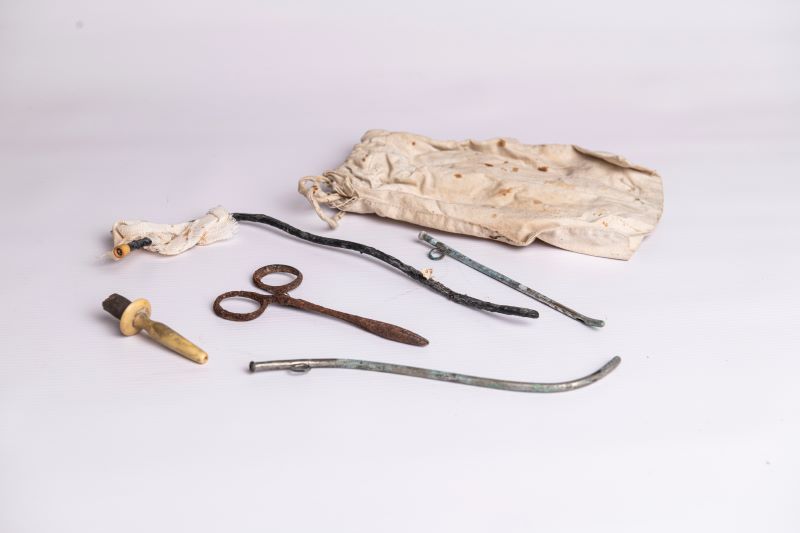The Digital Repository of Ireland (DRI) is a trusted digital repository (TDR), which provides reliable long-term preservation and access to Ireland’s humanities, cultural heritage, and social sciences digital data. DRI is also a research performing organisation engaged in a rich range of digital preservation-related research projects. In this new blog series, we invite you to get to know our research projects!
In the second blog in the ‘Get to Know Our Research Projects’ series, DRI Senior Programme and Communications Manager Áine Madden interviews Digital Archivist and Coordinator Clare Lanigan and Postdoctoral Researcher and Digital Archivist Dr Lorraine Grimes about the Wellcome Trust-funded Archiving Reproductive Health project (2020-2023).
Áine: Hi Clare, thank you for meeting with me today. Can you tell me a little bit about the aims of the Archiving Reproductive Health project and the kinds of collections that have been preserved?
Clare: Happy to! Archiving Reproductive Health is a Wellcome Trust-funded project coordinated by DRI, which is preserving digital material created by grassroots organisations working for reproductive justice in Ireland, especially during the 2018 referendum to repeal the Eighth Amendment of the Irish constitution. To date, Archiving Reproductive Health has published collections from key organisations that were involved with the campaign, and a range of oral history interviews with feminist and reproductive rights activists working in Ireland over the last 40 years.
The project will continue until the end of 2023 and the collections it creates are safely deposited in the Digital Repository of Ireland for the long term.
As part of the project, we’re also publishing documentation, holding events, and participating in conferences in Ireland and abroad.
Áine: Archiving Reproductive Health in partnership with Archives Ireland and Informa, held a Public Collection Day in Dublin City Library and Archive, Pearse St, Dublin, on 10 March 2023. Clare, can you tell us about a particularly interesting or significant object donated by a member of the public through this outreach event?
Clare: All the material donated for digitisation on the Collection day was fascinating and valuable, but I think the midwife’s bag of Nurse Mary Ann Fanning was among my favourites. The bag was part of the professional and personal effects of a midwife active in Fingal, County Dublin, in the early years of the 20th century. Nurse Mary Ann Fanning (1880–1964) worked in the Garristown area and beyond between the 1890s and the 1940s. The midwife’s bag and its contents includes catheters, pumps, medication, and medical records books. We’re very grateful to the family of Mary Ann Fanning for donating this material for digitisation and long-term preservation.

Áine: Thank you, Clare. Lorraine, as part of the project, the ARH team worked with the ‘In Her Shoes’ Facebook Group to digitally preserve stories of women’s lived experiences of living under the 8th Amendment in Ireland. What was the project’s approach to archiving sensitive social media data?
Lorraine: Well, first of all, we felt it was very important to archive these stories, which were instrumental in changing voters’ minds in the run up to the referendum. They provide a really important insight into the realities of an abortion ban and the impact it has had on women’s lives.
The creator of the page, Erin Darcy, had expressed her enthusiasm for archiving along with other moderators of the page. We, as DRI, posted on the Facebook page to let contributors know that we were archiving the page. The response we got was very positive. We put a policy in place if anyone wanted to have their story removed from the archive but so far no one has requested this.
Most of the stories were anonymous and not linked to any person’s page; however, in some instances personal information was mentioned which may have identified the person. We drew up anonymisation guidelines for the project taking a ‘minimised anonymisation approach’.
I sociologically coded the stories using MaxQDA software (similar to NVivo). These codes were then used as descriptions within the metadata for the story and as catalogue terms to make the stories searchable within the Repository.
Áine: Lorraine, as the primary researcher on the project, you developed ‘A Self-Care Protocol for Researchers’, which includes practical tips for working with sensitive data or traumatic material. Can you tell us more about the Self-Care Protocol and the value it may have for researchers on other projects?
Lorraine: I think, a lot of the time, as researchers we don’t think about the impact that research has on us personally. When we started this project we were conscious that as the researcher I would read code and anonymise over 1,000 stories about women’s experiences of being denied an abortion, having to travel abroad, or order pills online. Many of the stories included intimate partner violence, sexual assault, self-harm, and many forms of abuse. In order to protect myself, and others who would work with the dataset in future, I did some research around vicarious trauma, working with sensitive data, and potentially traumatic research. I developed a bibliography which you can find on Zotero. Based on the research and my own experience, I put together some practical tips on how to manage this type of work while also taking care of yourself. The protocol lists practical things that worked for me personally, but we encourage anyone working with the In Her Shoes dataset or other sensitive material to develop their own self-care protocol.
Áine: Thanks for your time today, Clare and Lorraine. Is there anything else you’d like to tell us about the project?
Clare: We hope that the project will be of use to researchers into the future. That’s why we’ve made all our research protocols openly accessible. We also developed a Guide to Archiving Digital Records for Volunteer and Community Groups, to help small organisations manage their digital collections. This guide is useful for our stakeholder organisations and for small volunteer organisations in general. We’ll be publishing an online Finding Aid for our collections, geared towards researchers, by November 2023 – all updates on publications can be found on the ARH Project Page.
Find out more about DRI’s research projects on our projects page.
Feature Image: Renee Summers. (2022) Photograph from 2016 March for Choice – many placards, Digital Repository of Ireland [Distributor], Digital Repository of Ireland [Depositing Institution], https://doi.org/10.7486/DRI.ht259926m




